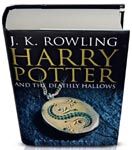Author: JK Rowling
Publisher: Bloomsbury
608 pages • £17.99
ISBN: 978-0-7475-9106-1
Rating:

And so, after ten years, seven books and one hell of a lot of sales, JK Rowling’s boy wizard saga finally comes to an end. Given the hype, the record breaking pre-sales, midnight trips to bookshops and helplines being set up to counsel kids distraught at the thought of Potter’s end, you’d be forgiven for thinking that book seven was the literary event of the decade. Not so. Rather it’s a very ordinary final outing that ties up the loose ends in a satisfactory but workmanlike way, without ever displaying the lightness of touch that marks out the fi nest kids’ books.
The brilliant conclusion of Half Blood Prince deserved so much more than Rowling delivers here. With Dumbledore murdered by the duplicitous Snape (always thought he was a bad ’un), the plot was primed for a rip-roaring romp, as Harry, Ron and Hermione chose to give their last year of school a miss to hunt for the “Horcruxes” that contain nasty Lord Voldemort’s fractured soul. Instead we’re subjected to chapter after chapter of nothing much happening (the wedding of an elder Weasley is a real plod) and the return of the moody, angsty Harry who was so unlikeable in book five (we know he’s got to save the world, but for God’s sake, lighten up…)
While not quite as unwieldy as Order of the Phoenix, The Deathly Hallows is in desperate need of a good editor, someone prepared to go through Rowling’s manuscript crossing out the passages that do nothing to advance the plot – think of the trees they could have saved. Without the rigid structure of the Hogwarts school year to fall back on, this lacks the sense of urgency that made the early books such pageturners, and the reliance on convenient plot devices like teleportation (or “apparition” in Potter-speak) leaves the lead trio’s quest strangely unfulfilling.
Then there’s the muddled tone. Rowling’s world has grown up faster than her writing, and those quirky character names and magical habits never quite mesh with dark wizards dishing out lethal Avada Kedavra curses like there was no tomorrow. Or an undomesticated werewolf taking a bite out of Ron’s ex. In The Deathly Hallows, the inevitable, necessary descent into darkness is clumsily represented by death, with so many characters bumped off (kids, teachers, baddies) that you soon become desensitised to it.
It’s only in the opening salvo and the denouement that Rowling really hits her stride. The first few chapters are cinema in literary form, with Harry’s airborne escape from the safety of his aunt and uncle’s house providing a spectacular chase sequence just begging to be committed to film. And once the author decides its time to take a break from the action to roll out the exposition (sadly she still hasn’t mastered the art of blending these together), everything starts to make sense in a way that puts most other big-money franchises to shame. We learn more about the enigma of Dumbledore than we have in the other six tomes put together, while Snape turns out to be the hero of the series bar none (okay, maybe we misjudged him…).
You can almost ignore the flab that bogged down the later books when you consider the depth of Rowling’s vision and the achievement of churning out a sequence of seven zeitgeist defining novels. Even so, you can’t help wondering where another storyteller might have gone had they been allowed to run wild in Rowling’s beautifully realised world.
Richard Edwards

